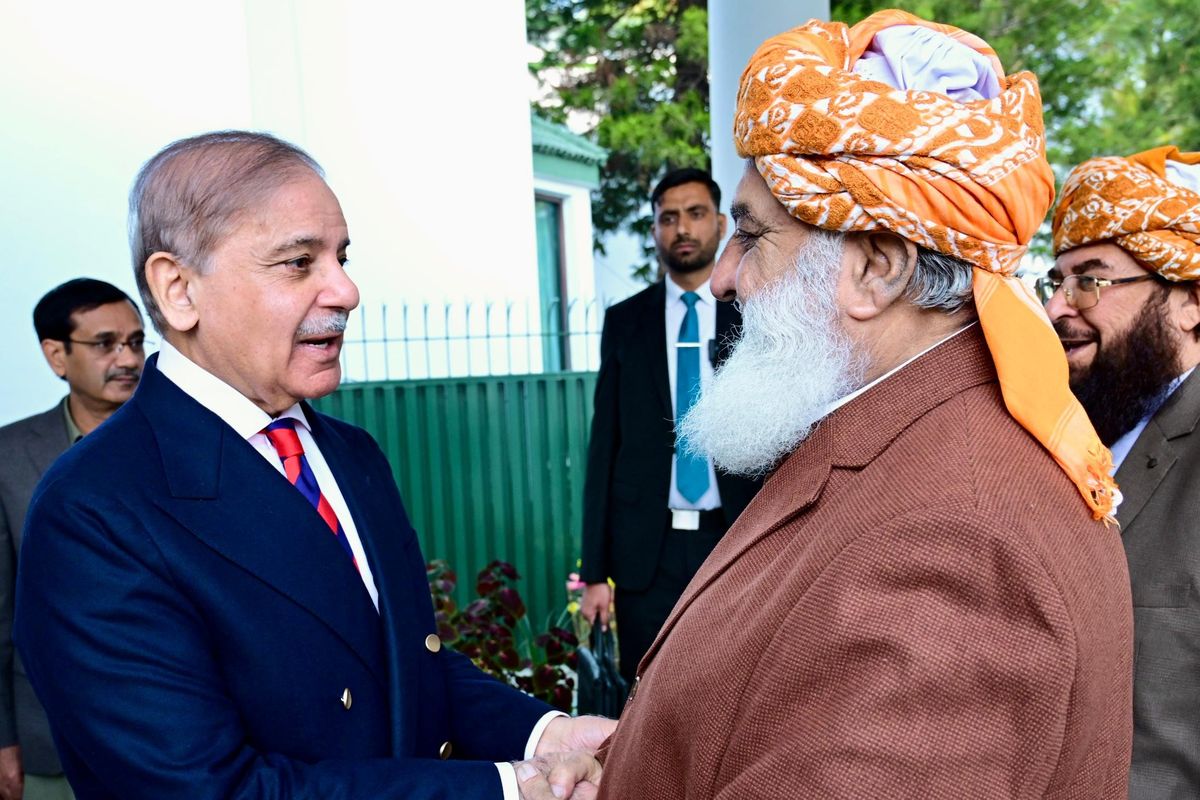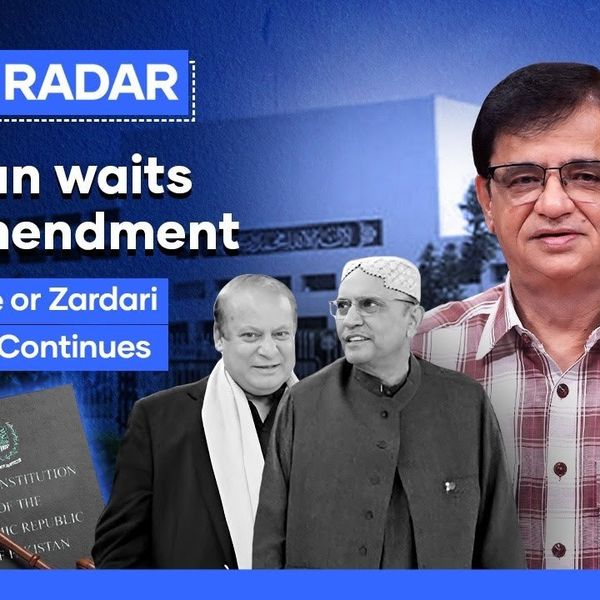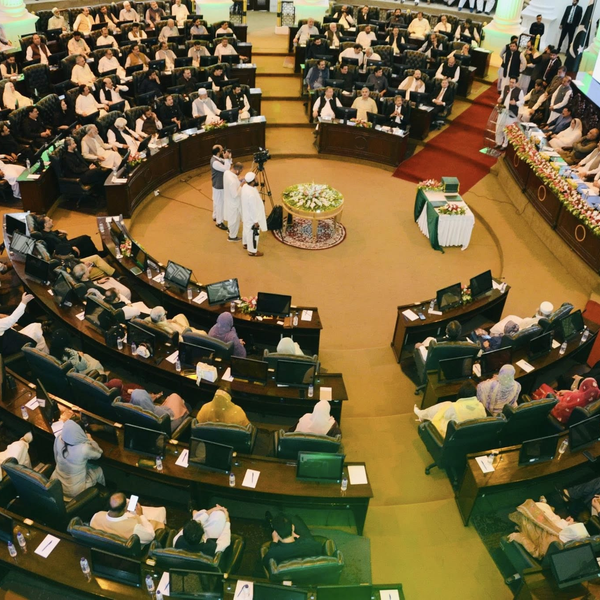Pakistan close to resolving political standoff over religious school registration bill
Legislation to become official next week after PM Sharif meets Fazlur Rehman, says JUI-F

Javed Hussain
Correspondent
I have almost 20 years of experience in print, radio, and TV media. I started my career with "Daily Jang" after which I got the opportunity to work in FM 103, Radio Pakistan, News One, Ab Tak News, Dawn News TV, Dunya News, 92 News and regional channels Rohi TV, Apna Channel and Sach TV where I worked and gained experience in different areas of all three mediums. My journey from reporting to news anchor in these organisations was excellent. Now, I am working as a correspondent with Nukta in Islamabad, where I get the opportunity of in-depth journalism and storytelling while I am now covering parliamentary affairs, politics, and technology.

Pakistan's Prime Minister Shehbaz Sharif shakes hands with Maulana Fazlur Rehman before their meeting to discuss proposed madrassa registration legislation, Friday, Dec. 20, 2024.
GoP
Meeting included high-level officials from multiple political parties and government positions
10 out of 15 madrasa boards agree to remain under Ministry of Education oversight
Bill had already passed both Senate and National Assembly on October 21
A long-running political dispute over madrassa registration in Pakistan has been resolved, according to Senator Kamran Murtaza of the influential Jamiat Ulema-e-Islam-Fazl (JUI-F) party, following talks on Friday between Prime Minister Shehbaz Sharif and religious political leader Maulana Fazlur Rehman.
The controversial bill, which would require Islamic religious schools (madrassas) to register with the government, will be dealt with in accordance with Pakistan's constitution, Prime Minister Sharif directed the law minister. The legislation is expected to be formally adopted after it appears in the government gazette next week.
The discussions took place during a meeting at the prime minister's residence, where JUI-F chief Rehman was joined by his senior leadership team including Secretary General Maulana Abdul Ghafoor Haideri, Maulana Asad Mahmood, and Senator Murtaza, who made the announcement about the resolution.
The meeting included Pakistan's top government officials: the Speaker of the National Assembly Sardar Ayaz Sadiq; Ishaq Dar, who serves both as Deputy Prime Minister and Foreign Minister; the Law Minister Azam Nazir Tarar; Information Minister Attaullah; the Prime Minister's key political advisor Rana Sanaullah; and Pakistan's Attorney General Mansoor Usman. The presence of these senior officials underscored the meeting's importance in resolving the dispute over madrasa registration.
Also present were representatives from Pakistan's other major ruling coalition member, the Pakistan Peoples Party (PPP), including former Prime Minister Raja Pervez Ashraf and Qamar Zaman Kaira, along with other high-ranking government officials.
What happened at the meeting?
According to the Prime Minister's Office, progress was made on Maulana Fazlur Rehman's proposals for madrasa registration. Sharif directed that the issues be resolved as swiftly as possible. He instructed the law ministry to take steps in accordance with the constitution and resolve the matter once and for all.
The Madrasa Registration Bill, "Society Registration Amendment Act 2024," along with the twenty-sixth constitutional amendment, was passed by both the Senate and National Assembly on October 21, 2024. When the bill was sent to the president, he initially delayed signing the bill, and later raised eight formal objections, which Maulana Fazlur Rehman's refused to accept.
Under Pakistan's legislative system, when parliament passes a bill, the president has 10 days to either sign it into law or return it with objections. If the president fails to act within this timeframe, the bill automatically becomes law. Additionally, while the President can reject a bill once, Parliament can override this by passing it again, after which the President cannot refuse to sign it. This constitutional framework was at the center of the dispute
Speaking to the media after the meeting, the JUI-F chief said he had reiterated his position on the madrasa registration bill, which has already been approved by parliament.
He noted that while the president could object to the bill once, the constitution and law do not permit it to be sent back a second time. He added that this time, the president sent the bill to parliament after the stipulated time period, but it has not yet been received by the Speaker's Office.
Maulana Fazlur Rehman said, "We have made it clear that this bill has become an act. The Speaker had responded to the President's objection in accordance with the constitution, but the President did not respond to this response."
'Positive' signs
"The Prime Minister has responded positively to our position," Fazlur Rehman added. "He has directed the Law Minister to take immediate practical action in accordance with the law and constitution. Perhaps there will be no need to call a joint meeting now, as our demand will be accepted."
In conversation with Nukta, Senator Kamran Murtaza said that the notification of the Madrasa Registration Bill "Society Registration Amendment Act 2024" is expected to be issued in the official gazette early next week.
Jamiat Ulema Council chief Hafiz Muhammad Tahir Mahmood Ashrafi addressed the differences among madrasa boards regarding registration. He stated, "If the government allows the Ittehad-e-Tanazem Madrasas to be affiliated with the Ministry of Industries, we have no objection. Ten out of fifteen madrasa boards agree they should remain affiliated with the Ministry of Education."
He emphasized that issues should be resolved through dialogue, and the government should take all madrasa boards into confidence regarding any law or amendments. "We hope the views of both sides will be considered regarding madrasa registration. We cannot give up on our demand. While it is good that the Prime Minister has resolved the issue, we will wait to see the notification. We will not back down from our position."










Comments
See what people are discussing